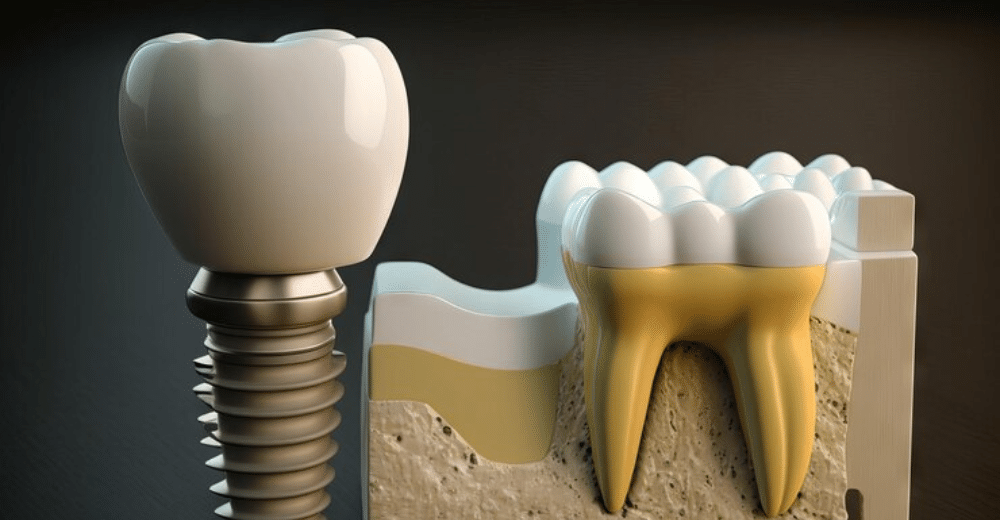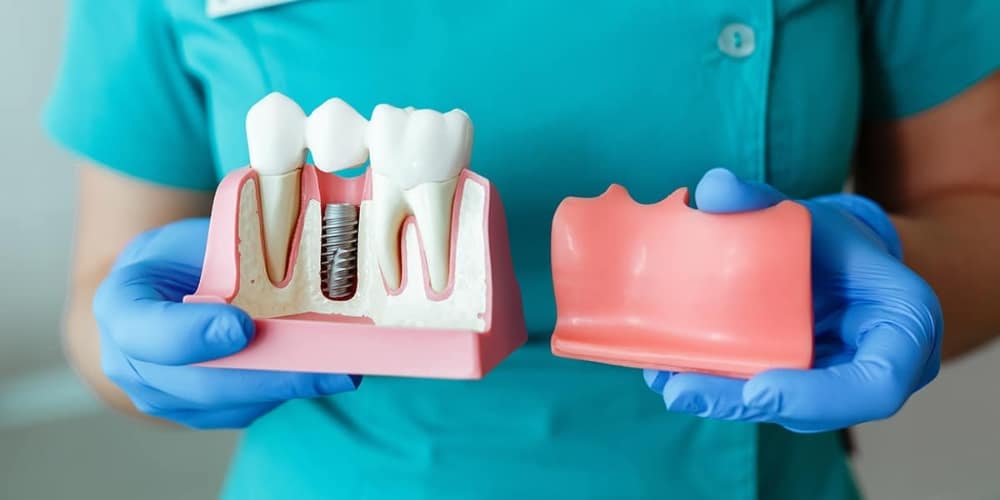Published on February 19, 2024

Congratulations on investing in your smile with dental implants! Now that you’ve taken this significant step towards oral health and confidence, it’s crucial to maintain your new implants properly. Just like natural teeth, dental implants require regular care and attention to ensure they remain healthy and functional for years to come. Here’s how you can take care of your dental implants effectively:
Understanding the Basics
Before delving into the specifics of dental implant care, let’s briefly understand what dental implants are and how they work. Dental implants are artificial tooth roots made of biocompatible materials such as titanium, which are surgically implanted into the jawbone. These implants provide a sturdy foundation for replacement teeth, such as crowns or bridges, to be attached securely.

Daily Oral Hygiene Routine
Maintaining a consistent daily oral hygiene routine is essential for the longevity of your dental implants. Just like natural teeth, implants can accumulate plaque and bacteria if not cleaned properly. Here’s what you should include in your daily oral care regimen:
- Brushing: Use a soft-bristled toothbrush to gently brush your teeth and implants at least twice a day. Pay close attention to areas where the implants meet your gums to prevent plaque buildup.
- Flossing: Flossing is crucial for removing food particles and plaque from between your teeth and around the implants. Be sure to use a floss threader or interdental brushes specifically designed for implants.
- Antimicrobial Mouthwash: Rinse with an antimicrobial mouthwash to reduce bacteria and maintain a healthy oral environment. Choose a mouthwash recommended by your dentist and incorporate it into your daily routine.
Regular Dental Checkups
In addition to maintaining good oral hygiene at home, regular visits to your dentist are essential for monitoring the health of your dental implants. Your dentist will perform thorough examinations and cleanings to ensure that your implants are in optimal condition. These checkups also allow your dentist to detect any issues early on and address them before they escalate.
Avoiding Damaging Habits
Certain habits can damage your dental implants and compromise their longevity. It’s important to be mindful of the following:
- Avoid Chewing Hard Objects: Refrain from chewing on hard objects such as ice, pens, or hard candies, as this can exert excessive pressure on your implants and lead to damage.
- Quit Smoking: Smoking can have detrimental effects on oral health and implant success. It impairs the healing process and increases the risk of implant failure. If you smoke, consider quitting to support the longevity of your implants.
- Protecting Against Teeth Grinding: If you have a habit of grinding your teeth, known as bruxism, discuss this with your dentist. They may recommend wearing a nightguard to protect your implants and natural teeth from damage during sleep.
Healthy Lifestyle Choices
Maintaining overall health and well-being contributes to the success of your dental implants. A balanced diet rich in nutrients supports optimal healing and gum health. Additionally, staying hydrated promotes saliva production, which helps cleanse the mouth and prevent bacterial growth.
Monitoring Changes
Vigilance is key when it comes to the long-term success of your dental implants. While dental implants are designed to be durable and resilient, they can still be susceptible to certain issues over time. Monitoring changes in the appearance or feel of your implants is essential for early detection and prompt intervention. Here’s what to look out for:
Inflammation
Keep an eye on the gums surrounding your dental implants. Redness, swelling, or tenderness could indicate inflammation, which may be a sign of peri-implantitis—a condition similar to gum disease but affecting the tissues around the implant. Prompt treatment is necessary to prevent further complications and preserve the health of your implants.
Discomfort or Pain
Any persistent discomfort or pain around your dental implants should not be ignored. While some minor discomfort immediately after the implant procedure is normal, ongoing pain could indicate an underlying issue, such as infection or implant failure. Your dentist can evaluate the source of the discomfort and recommend appropriate treatment.
Looseness or Mobility
Dental implants are intended to be firmly anchored in the jawbone, providing stability for chewing and speaking. If you experience any looseness or mobility in your implants, it’s crucial to seek immediate attention from your dentist. Looseness could be a sign of implant failure or bone loss, requiring prompt intervention to prevent further complications.
Changes in Bite Alignment
Changes in the alignment of your bite, such as difficulty biting or chewing properly, may indicate issues with your dental implants. Misalignment can result from various factors, including implant malposition, bone loss, or prosthetic complications. Your dentist can assess the situation and recommend appropriate adjustments to restore proper bite function.
Unusual Sensations
Be mindful of any unusual sensations, such as tingling, numbness, or a metallic taste in your mouth, around the area of your dental implants. These sensations could be indicative of nerve damage or other underlying issues that require attention from your dentist.
Visible Changes in Appearance
Examine your dental implants regularly for any visible changes, such as discoloration, swelling, or protrusion of the implant crown or abutment. These changes may signal complications such as infection, bone loss, or prosthetic damage. Addressing these issues promptly can help prevent further damage and preserve the aesthetic appearance of your smile.
Proper care and maintenance are crucial for maximizing the lifespan of your dental implants. By following a diligent oral hygiene routine, attending regular dental checkups, avoiding damaging habits, making healthy lifestyle choices, and monitoring changes, you can ensure the long-term success of your investment in a radiant smile. Remember, your dentist is your partner in oral health, so don’t hesitate to reach out if you have any concerns or questions regarding your dental implants.
Frequently Asked Questions (FAQs) About Dental Implants
1. How long do dental implants last?
Ans: Dental implants are designed to be a long-term solution for tooth replacement, with proper care and maintenance. On average, dental implants can last upwards of 20 years or more. However, individual factors such as oral hygiene practices, overall health, and lifestyle habits can influence the lifespan of implants.
2. Is the dental implant procedure painful?
Ans: The dental implant procedure is typically performed under local anesthesia to minimize discomfort during the surgery. Patients may experience some minor discomfort or soreness following the procedure, which can be managed with over-the-counter pain medication. Your dentist will provide detailed instructions for post-operative care to ensure a smooth recovery process.
3. Are dental implants suitable for everyone?
Ans: While dental implants are a highly successful option for most individuals with missing teeth, certain factors may affect candidacy. Adequate bone density and healthy gums are essential for the success of dental implants. Your dentist will evaluate your oral health, medical history, and specific needs to determine if dental implants are the right option for you.
4. How much do dental implants cost?
Ans: The cost of dental implants can vary depending on several factors, including the number of implants needed, the complexity of the procedure, and any additional treatments required, such as bone grafting or sinus augmentation. While dental implants may require a higher initial investment compared to other tooth replacement options, they offer significant long-term benefits in terms of durability and functionality.
5. What is the recovery time after getting dental implants?
Ans: The recovery time after dental implant surgery can vary from person to person and depends on factors such as the number of implants placed and individual healing capabilities. In general, most patients can expect some initial swelling, bruising, and discomfort for a few days following the procedure. It’s essential to follow post-operative instructions provided by your dentist and attend follow-up appointments for monitoring your progress. Full integration of the implants with the jawbone typically takes several months, during which temporary restorations may be worn.
